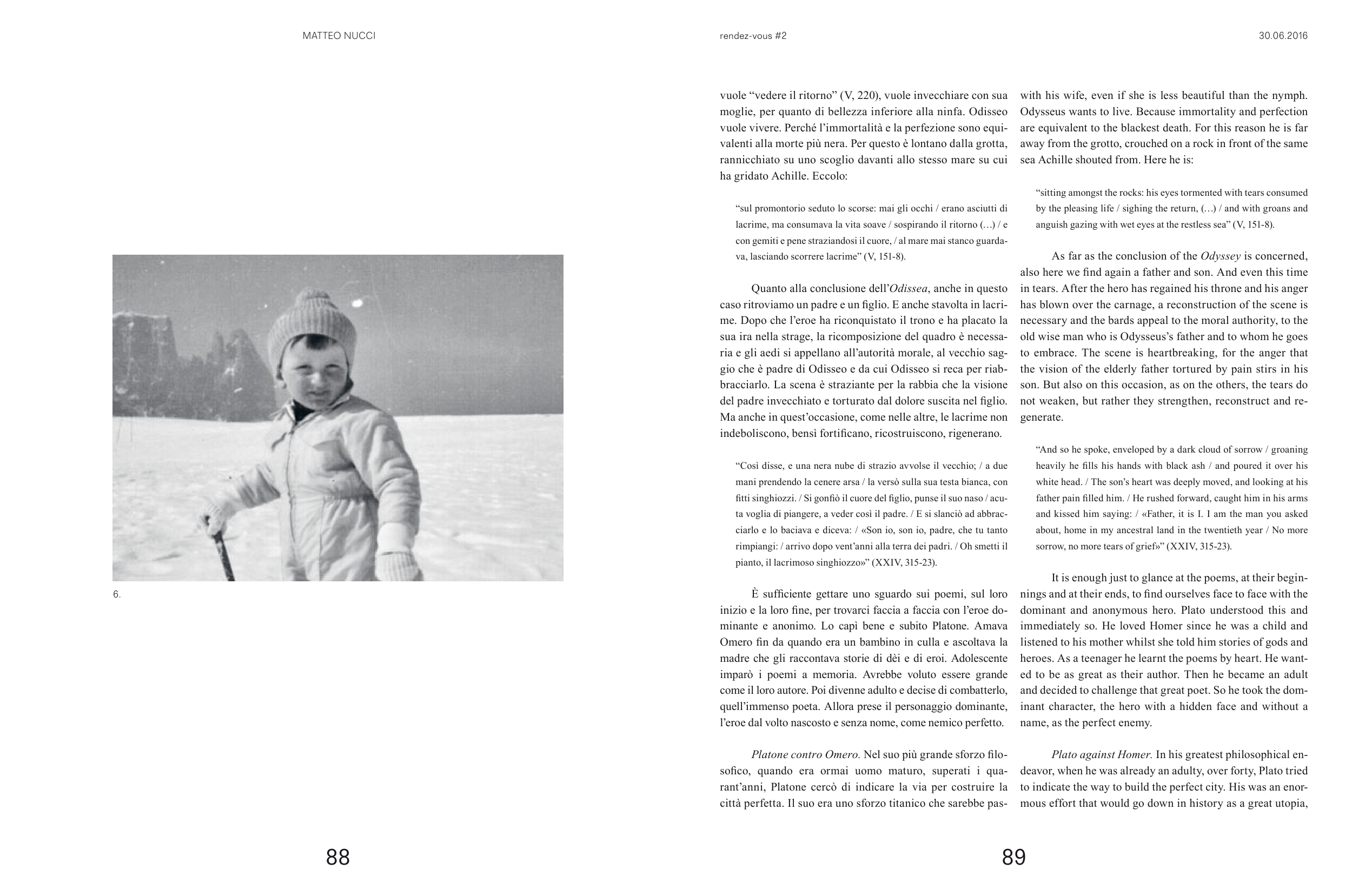88
89
vuole “vedere il ritorno” (V, 220), vuole invecchiare con sua
moglie, per quanto di bellezza inferiore alla ninfa. Odisseo
vuole vivere. Perché l’immortalità e la perfezione sono equi-
valenti alla morte più nera. Per questo è lontano dalla grotta,
rannicchiato su uno scoglio davanti allo stesso mare su cui
ha gridato Achille. Eccolo:
“sul promontorio seduto lo scorse: mai gli occhi / erano asciutti di
lacrime, ma consumava la vita soave / sospirando il ritorno (…) / e
con gemiti e pene straziandosi il cuore, / al mare mai stanco guarda-
va, lasciando scorrere lacrime” (V, 151-8).
Quanto alla conclusione dell’Odissea, anche in questo
caso ritroviamo un padre e un fi glio. E anche stavolta in lacri-
me. Dopo che l’eroe ha riconquistato il trono e ha placato la
sua ira nella strage, la ricomposizione del quadro è necessa-
ria e gli aedi si appellano all’autorità morale, al vecchio sag-
gio che è padre di Odisseo e da cui Odisseo si reca per riab-
bracciarlo. La scena è straziante per la rabbia che la visione
del padre invecchiato e torturato dal dolore suscita nel fi glio.
Ma anche in quest’occasione, come nelle altre, le lacrime non
indeboliscono, bensì fortifi cano, ricostruiscono, rigenerano.
“Così disse, e una nera nube di strazio avvolse il vecchio; / a due
mani prendendo la cenere arsa / la versò sulla sua testa bianca, con
fi tti singhiozzi. / Si gonfi ò il cuore del fi glio, punse il suo naso / acu-
ta voglia di piangere, a veder così il padre. / E si slanciò ad abbrac-
ciarlo e lo baciava e diceva: / «Son io, son io, padre, che tu tanto
rimpiangi: / arrivo dopo vent’anni alla terra dei padri. / Oh smetti il
pianto, il lacrimoso singhiozzo»” (XXIV, 315-23).
È suffi ciente gettare uno sguardo sui poemi, sul loro
inizio e la loro fi ne, per trovarci faccia a faccia con l’eroe do-
minante e anonimo. Lo capì bene e subito Platone. Amava
Omero fi n da quando era un bambino in culla e ascoltava la
madre che gli raccontava storie di dèi e di eroi. Adolescente
imparò i poemi a memoria. Avrebbe voluto essere grande
come il loro autore. Poi divenne adulto e decise di combatterlo,
quell’immenso poeta. Allora prese il personaggio dominante,
l’eroe dal volto nascosto e senza nome, come nemico perfetto.
Platone contro Omero. Nel suo più grande sforzo fi lo-
sofi co, quando era ormai uomo maturo, superati i qua-
rant’anni, Platone cercò di indicare la via per costruire la
città perfetta. Il suo era uno sforzo titanico che sarebbe pas-
with his wife, even if she is less beautiful than the nymph.
Odysseus wants to live. Because immortality and perfection
are equivalent to the blackest death. For this reason he is far
away from the grotto, crouched on a rock in front of the same
sea Achille shouted from. Here he is:
“sitting amongst the rocks: his eyes tormented with tears consumed
by the pleasing life / sighing the return, (…) / and with groans and
anguish gazing with wet eyes at the restless sea” (V, 151-8).
As far as the conclusion of the Odyssey is concerned,
also here we fi nd again a father and son. And even this time
in tears. After the hero has regained his throne and his anger
has blown over the carnage, a reconstruction of the scene is
necessary and the bards appeal to the moral authority, to the
old wise man who is Odysseus’s father and to whom he goes
to embrace. The scene is heartbreaking, for the anger that
the vision of the elderly father tortured by pain stirs in his
son. But also on this occasion, as on the others, the tears do
not weaken, but rather they strengthen, reconstruct and re-
generate.
“And so he spoke, enveloped by a dark cloud of sorrow / groaning
heavily he fi lls his hands with black ash / and poured it over his
white head. / The son’s heart was deeply moved, and looking at his
father pain fi lled him. / He rushed forward, caught him in his arms
and kissed him saying: / «Father, it is I. I am the man you asked
about, home in my ancestral land in the twentieth year / No more
sorrow, no more tears of grief»” (XXIV, 315-23).
It is enough just to glance at the poems, at their begin-
nings and at their ends, to fi nd ourselves face to face with the
dominant and anonymous hero. Plato understood this and
immediately so. He loved Homer since he was a child and
listened to his mother whilst she told him stories of gods and
heroes. As a teenager he learnt the poems by heart. He want-
ed to be as great as their author. Then he became an adult
and decided to challenge that great poet. So he took the dom-
inant character, the hero with a hidden face and without a
name, as the perfect enemy.
Plato against Homer. In his greatest philosophical en-
deavor, when he was already an adulty, over forty, Plato tried
to indicate the way to build the perfect city. His was an enor-
mous effort that would go down in history as a great utopia,
6.
MATTEO NUCCI
30.06.2016
rendez-vous Δ2


